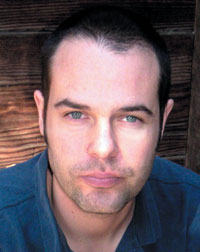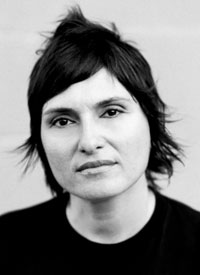25 NEW FACES OF INDIE FILM 2004
 |
| PHOTO: TODD WARNOCK. |
Performance artist Miranda July is directing and starring in her first movie, and the production office is in her Portland, Ore., home. “They just moved in a Xerox machine,” she said. “They rented it — I didn’t even know you could do that. My first thought was, Free copies! Now’s the time to make a fanzine!”
July, whose video artwork and one-woman performance shows have been celebrated at MoMA, the Whitney Biennial and galleries all over the world, may be embracing a new medium with her debut feature, Me and You and Everyone We Know, but she doesn’t see it that way. “When I performed, I always thought of performances as being like movies, just without all that equipment. I wanted to make movies back in high school, and for some reason the path I’ve taken has been the most direct one.”
July says her love of cinema sprang from an unlikely filmic influence: the Christopher Reeve time-travel flick Somewhere in Time. “I saw it as a child,” she recalls, “and it embodied in me the sense that magic could happen. When I saw it, I really believed I could go back in time. That connects to why I went into performance — it’s about something feeling real to the people who are in the room. And that remains my goal in film: to have everyone in the theater feel that their experience could only have happened here, tonight. I almost don’t think of movies as not being live.”
Describing the film, which consists of a series of darkly comic yet sweetly empathetic encounters, July says, “It’s about children and adults trying to figure out how to touch each other. Of course that’s totally inaccurate, but the questions this description raises are the correct ones.” — Scott Macaulay
Contact: www.mirandajuly.com
 |
Many independent filmmakers take years to get their first features made. But few have stories with as many false starts and near misses as 31-year-old Jacob Aaron Estes and his film Mean Creek. In 1997 Estes wrote the first draft of the script, a cautionary tale about a group of kids whose plan to seek revenge on an overweight bully goes tragically wrong. After winning the prestigious Nicholls Fellowship, the film languished in development. Luck finally came to Estes when Whitewater Films, headed by Estes’s former AFI professor Rick Rosenthal, signed on to finance the film last year.
Mean Creek premiered at Sundance, screened in the Directors’ Fortnight at Cannes and was picked up for distribution by Paramount Classics, which plans to release the film on August 20. “I guess my dream was get into Sundance, Cannes and get distribution, and that’s happened. I can’t really believe it,” says Estes, whose upcoming projects include two writing assignments: adapting the novel Nearing Grace (which Rosenthal will direct for Killer Films) and a script for Rob Reiner and Warner Independent Pictures. — Matthew Ross
Contact: Guymon Casady at Management 360: (310) 272-7000, Jill Cutler at CAA: (310) 288-4545 www.meancreekmovie.com
 |
Soon after the release of Kissing Jessica Stein, the Web was flooded with requests for the “great, jazzy almost bossa nova grooves” NOT contained on that film’s soundtrack CD release. The man behind that score? Brazilian pianist and composer Marcelo Zarvos.
“I’ve always composed music with literature and drama in mind, even before the film work, stories that moved me,” says Zarvos. “So the idea of composing for narrative features was not so far from my way of working.” A slew of feature film work after Jessica Stein’s success (including The Escape Artist, The Mudge Boy and the forthcoming The Door in the Floor with Jeff Bridges and Kim Basinger) are a strong sign that Zarvos’s music will continue to keep moviegoers’ feet tapping long after the end credits roll. — André Salas
Contact: info@zarvos.com, www.zarvos.com
 |
“I love stories about people who most people don’t think about,” says Rayya Elias, whose first film, Anonymous, is loosely based on her experiences living in New York City in the mid-1980s as a lesbian addicted to heroin . The half-hour short features an original score, largely composed by Elias, terrific performances, inventive set design and period costumes, and a keen sense of humor about what must have been a very bleak period in her life. It was shot on DV over eight days in 2003 for $15,000.
Born in Syria in 1960, Elias grew up in Detroit, Michigan. An aspiring rock musician, she made her way to New York City in 1983 and worked as a hair stylist, traveling the world as art director for a large international company. “I came to New York to become a rock star but I became a hair star,” she jokes.
She long since kicked her drug habit and now works freelance as a stylist, but as part of her recovery Elias began writing a series of semi-autobiographical stories; last year, with a friend’s prodding, she decided to begin filming them.
“They were tragic yet comic, and they gave voice to all these characters I had known — many of who aren’t alive anymore. I also wanted to mold my stories into a series about a female hustler,” she adds. “After all, you never see films about a female Clint Eastwood out there living on the Lower East Side in the 1980s!”
Elias is currently prepping her second short and has completed a feature screenplay called The Cleaning Lady, “about the person who cleans your home but who you don’t think about as having a life of her own.” — Steve Gallagher
Contact: rayya@mindspring.com
 |
5 Andrij Parekh
Ari Gold’s Helicopter, Jessica Sharzer’s The Wormhole, Victor Buhler’s Chaperone and Anthony Ng’s …(dot dot dot) are some of the best shorts to come out of NYU in recent years, but aside from the fact that they are all prizewinners, they have one thing in common: they were all shot by Andrij Parekh. And while he has no plans to hang up his lens kit, Parekh added to his list of cinematography awards when he nabbed one himself for directing recently. His short Dead Roosters (Mertvi Pivni), shot in Ukraine, won the Grand Marnier Film Fellowship at last year’s New York Film Festival.
“My mom is Ukrainian,” Parekh explains, “and I have a lot of contacts there, including some Americans who opened up a production company. So I decided to take 10 recans and not to leave until I had shot my thesis film. There was no script — just a one-page scenario, available light, actors improvising and the crew was the producer, who recorded sound, and myself. I used one 35mm lens.”
Parekh credits d.p. Harris Savides (The Game, Elephant) with instilling in him a passion for lensing when he served as his apprentice on James Gray’s The Yards. “It was the way he approached cinematography and his gentle nature. Previously, my idea of a d.p. was a construction foreman barking orders. Harris was gentle and introspective on the set, and I realized that a d.p. could be the director’s ally. So all my cinematography has been very director-bound. I try to find out what they want to see and what emotion they want to express. It’s very important to me that the image feels like something — that it is soulful. If not, there’s nothing there.”
Parekh is currently in Brazil shooting his third feature, Kirill Mikhanovsky’s Dreaming of Fish — the other two are Sharzer’s Sundance title Speak and Philip Farha’s Messengers — and he recently completed another film in Ukraine, Snowblink (Zimove Vesilya), with writer and co-director Sophie Barthes. — S.M.
Contact: andrij@onebox.com New York Office: (212) 545-7895
VOD CALENDAR


 See the VOD Calendar →
See the VOD Calendar →


